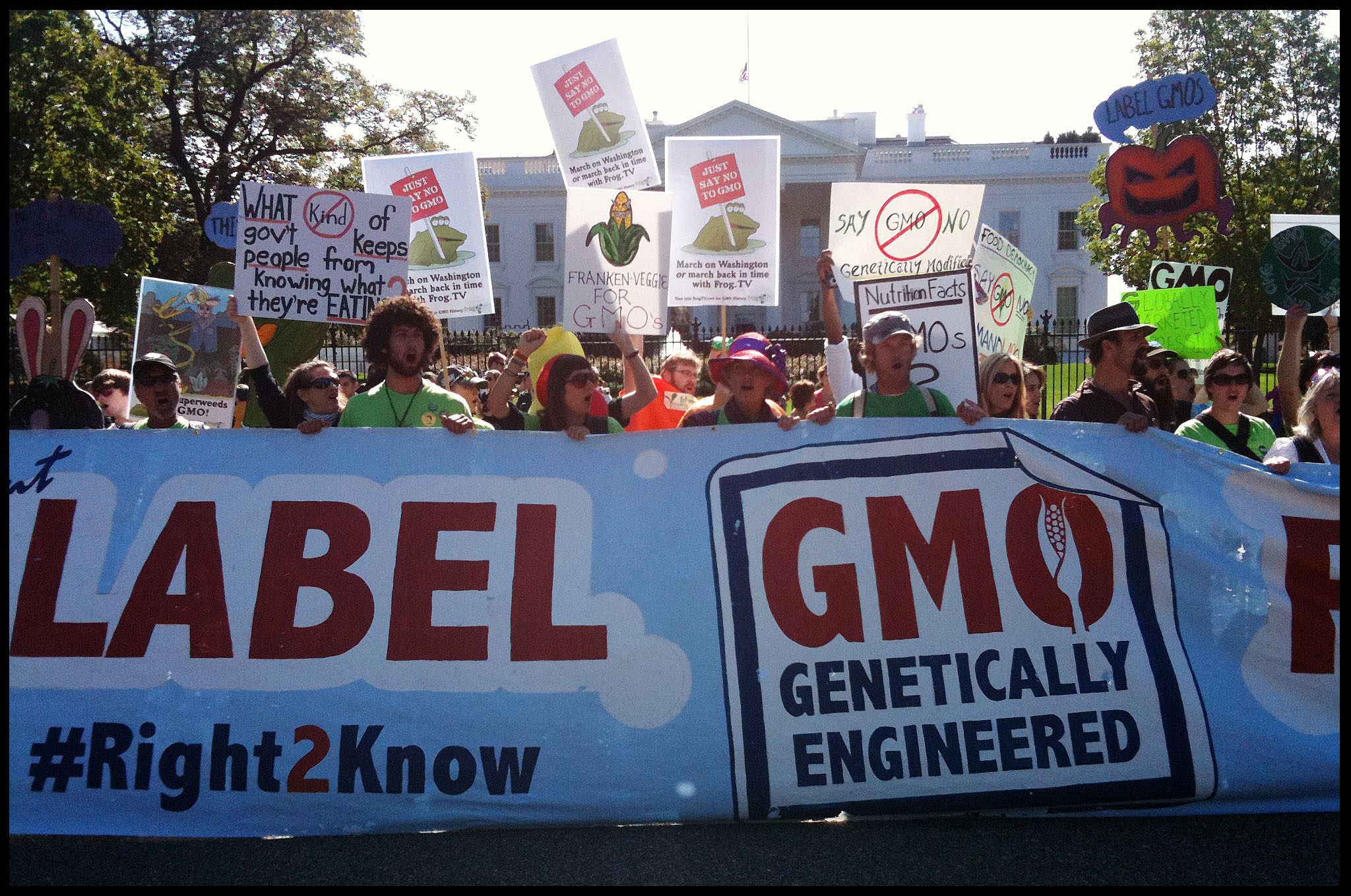 by guest blogger Isaac Eliaz, MD, MS, Lac, integrative medicine pioneer
by guest blogger Isaac Eliaz, MD, MS, Lac, integrative medicine pioneer
Whether we like it or not, genetically modified organisms (GMOs) currently dominate much of our commercial food supply. At last count, as much as 70 percent of the food in an average grocery store in the United States contained GMO ingredients. Modified corn is particularly prevalent, as it’s used in so many products.
It’s no accident that GMOs have become so prevalent. Large biotech corporations, such as Monsanto, have been stealthily increasing the number of GMO food strains—and increasing their own profits—since the ’90s. They seem to be zealously guarding their territory, pouncing on legislation that might pose restrictions on these modified crops.
Just look at what happened to Proposition 37, the California ballot initiative that would have forced sellers of GMO foods sold in California to label them as such. This seems like a simple, commonsense precaution, but an avalanche of industry money defeated it.
To make matters worse, a highly controversial federal bill was passed earlier this year, informally dubbed “The Monsanto Protection Act.” This provision allows companies and farmers to ignore court orders that would restrict GMO crops if they have been found to be hazardous to human health, animal health, or the environment.
However, on June 4th the news broke that Connecticut state legislators overwhelmingly passed the country’s first GMO labeling law—a significant victory for the Right to Know movement, which has pushed for consumers to be informed about the presence of GMOs in their food.
Do We Need Protection?
Whenever it’s faced with criticism, the biotech industry responds by saying there’s no evidence GMOs cause harm. That statement isn’t exactly correct: A number of short-term studies do show reason for concern, and we know next to nothing about the long-term health consequences of GMOs. To further obscure the issue, many of the expert voices asserting GMO safety are not independent scientists, but rather are industry insiders with close ties to the biotech giants.
GMOs are made much the same way many new drugs are developed: Foreign DNA is inserted into the plant genome to give it different characteristics, similar to adding a new chemical group onto an existing molecule to create a new drug. But while drugs must undergo rigorous testing, GMOs in comparison essentially receive a free pass. A number of independent studies are emerging, however, exposing the reality that there are potential dangers. Here are several examples:
- An animal study published in 2009 clearly showed the harmful effects of three types of GM corn, particularly on kidney and liver function.
- A recent European Food Safety Authority study discovered portions of a virus gene in many GMO varieties. Some are concerned that this gene might make these GMOs unsafe.
- One of the “selling points” for GMO crops is that they require fewer pesticides, as pesticides are incorporated into the plant genome. But those protections are apparently wearing off. Researchers at Iowa State University have found that corn rootworms have adapted to GMO corn, forcing farmers to increase their pesticide use, which has significant impacts on human health and the environment.
- Another issue is Roundup, the world’s most popular herbicide, also made by Monsanto. Again, it’s no coincidence that many GMO crops are designed to withstand higher doses of Roundup. However, recent research has shown that glyphosate, the active ingredient in Roundup, may cause a number of diseases, including cancer and Parkinson’s disease.
- Other animal studies have also shown a variety of dangers. GMO crops, particularly soy and corn, have been found to affect fertility, immunity, allergies, and birth weight, in addition to accelerating aging and causing cancer.
Act Locally
The question is: As health-minded consumers, how do we respond? First, we vote in the marketplace.
This is already happening. Many food companies are feeling the pressure from consumers who want to avoid GMO ingredients in their foods. Hundreds of food companies have been working with the Non-GMO Project to have their products certified as GMO free. This is entirely market driven. Where government has failed to act, or acts in the interests of corporations over people, individuals can make choices with their wallets while activist groups raise awareness of these critical issues. And as we’re starting to see, this movement has significant power to influence industry practices. In fact, some reports suggest that the Monsanto Protection Act may soon be repealed because of the massive outpouring of public opposition.
For those seeking to avoid GMO foods, the Non-GMO Project offers a cheat sheet. High-risk plants include nonorganic corn, wheat, canola, rice, soy, sugar beets, zucchini, flax, and papaya. Organic foods are not completely fail-safe, but they improve our odds significantly. Also, when going to the grocery, look for a Non-GMO Project seal verifying an item is GMO-free.
Battle Back
While a consumer boycott may ultimately bring more GMO-free choices, it’s a slow process. In the meantime, there are a number of ways to mitigate the potential dangers of GMO foods.
A growing number of studies are suggesting that GMOs hinder digestion. In fact, they may be changing our digestive lining, destroying our friendly flora, and inhibiting critical digestive enzymes. Probiotic foods, such as fermented vegetables, coconut- or dairy-based kefirs, yogurt, and miso, support a healthy gut flora population. Prebiotic fiber found in plants like whole grains, onions, bananas, garlic, leeks, and artichokes feed those good microbes and help strengthen and repair the digestive tract. Probiotic supplements can also be helpful. Aromatic spices like cinnamon, cardamom, and ginger benefit digestion while adding wonderful flavors to recipes. There are a number of other herbs and botanicals, often referred to as “bitters,” that improve digestion. I also recommend the minerals zinc and chromium, as well as digestive enzymes like amylase, protease, and lipase.
GMOs may be linked to our growing allergy problem. If you suffer from seasonal allergies, there are a number of natural antiallergy strategies (including comprehensive detoxification) that can help reduce inflammation and balance the immune response to address symptoms at their root. An elimination diet may also be helpful, especially in the case of food allergies.
The anti-GMO movement is growing, not just in the U.S., but across the world, too. Individuals and entire countries are opposing GMOs on a global scale, demonstrating once again that people can indeed move mountains. On May 25th, 2013, more than 2 million people in 50-plus countries gathered to join the March Against Monsanto, representing a significant tipping point in global awareness of this critical issue, which extends beyond GMOs to include basic human rights and access to healthy food.
Write your legislators about the “Monsanto Protection Act,” formally titled The Farmer Assurance Provision. Stay abreast of new findings on GMOs and do your best to avoid them in the store. If we lead, public policy will ultimately follow.
Congratulations, Connecticut! We hope your legislative success in GMO labeling will become a model for the rest of the country and the world.
 Isaac Eliaz, MD, MS, LAc, integrates Western medicine with his extensive knowledge of traditional Chinese, Tibetan, Ayurvedic, homeopathic, and complementary medical systems. With more than 25 years of clinical experience and research, Dr. Eliaz has a unique holistic approach to the relationship between health and disease, immune enhancement, detoxification, and cancer prevention and treatment. For more information about his work, visit dreliaz.org.
Isaac Eliaz, MD, MS, LAc, integrates Western medicine with his extensive knowledge of traditional Chinese, Tibetan, Ayurvedic, homeopathic, and complementary medical systems. With more than 25 years of clinical experience and research, Dr. Eliaz has a unique holistic approach to the relationship between health and disease, immune enhancement, detoxification, and cancer prevention and treatment. For more information about his work, visit dreliaz.org.




Thanks for this terrific article. Can you suggest an alternative to canola for frying. We don’t fry often, but my people are from the South and fried chicken is on the menu some days! Would appreciate an alternative to my standby canola, which I no longer want to use. Thanks!
We all need to fight Monsanto with our wallets. Money is the only thing they respond to, and if we don’t buy any GMO foods, they will be forced to stop putting this poison in our food. I only buy organic or food that says Non-GMO. Our elected officials seem to have completely sold out for Monsanto’s money. In the present Farm Bill the majority of Senators voted NO to an amendment which would allow States the right to label their food as containing GMO’s. A right we already have and I’m not sure they can take it away from us. Japan will not accept a shipment of wheat from our farmers because Monsanto’s GMO wheat has gotten into the non-GMO wheat. And Monsanto’s GMO wheat isn’t even on the market yet. But Japan and many countries know that GMO’s are not good for their people. I wish our Congress would care as much about the health of our people as they do about their own wealth. Thank you for your article and keep up the good work!
Coconut oil is great for frying. It has a high burn point and is a MCT.
I agree about voting with your pocketbook. The only way for things to change is if our favorite food companies know that we are concerned about it. I emailed two companies yesterday: Popcorn, Indiana (gourmet popcorn w/lots of different toppings) and Marie Callendars (frozen food meals). Both wrote back. The popcorn is GMO free, but the toppings are not, but they are members of the GMO Free Project and are trying to switch over. Marie Callendars, on the other hand, is happy that they can serve us gmo-laden foods.
I don’t know what foods you eat, but letting the people in charge know that you care and will buy accordingly, is a great way to get info out and make a difference.
Grapeseed oil is also nice, and doesn’t impart as strong a flavour as coconut. (Although I like coconut, too.)
louis vuitton コレクション